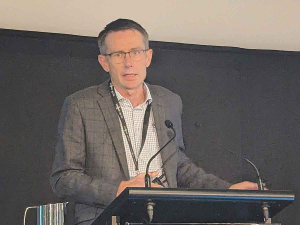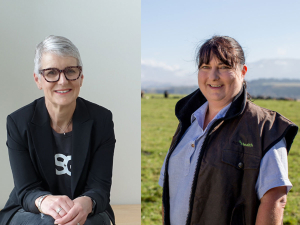It may be dry onfarm right now, but we’ll soon be heading through autumn to winter.
So it’s worth starting to think now about good stock wintering practice ahead of the wetter months, to protect animal health, soil health, water quality and pasture production.
High stock densities and soil moisture in winter can lead to much soil damage. Wet pasture, heavy grazing and the resulting compaction can reduce pasture growth and drag down farm productivity, effects that can last several seasons.
Break feeding of forage crops has a similar effect on soil structure, but because it results in bare soils the environmental effects of runoff can be much worse, including increased runoff of sediment, dung, urine and nutrients, all of which affect water quality. Mitigating the effects of such practices bring many complex challenges.
Besides livestock density, the selection of feeding out sites and the management of wintering systems are factors affecting water quality.
Various stock wintering options can help mitigate these various risks.
Feed pads and stand-off pads are options for protecting soil physical structure during wet periods.
A feed pad is a dedicated concrete platform where supplementary feeds are brought to the stock. Higher feed efficiency is achieved as the wastage is reduced to about 5%, compared to about 20% or more when silage is fed in paddocks. They are generally not suitable for standing stock for extended periods so their potential to protect soils is limited.
A stand-off pad is a dedicated loafing area for stock. These pads are constructed using a softer free-draining surface and utilise materials like wood chips. As stock can be withheld from pasture for longer times, the area required per cow has to be bigger – say about 8m2.
Capture of effluent is important on stand-off pads. The base should be sealed either with an artificial liner or with concrete, and effluent directed into the treatment system.
Animal shelters are also gaining popularity. These combine a feeding platform and stand-off facility, and give animals shelter from the worst of the weather. They allow stock to be kept off paddocks for extended periods, thereby protecting the farm production system from damage even in a very wet winter.
When building any wintering pad allow for solid and liquid waste disposal. Design the pad so that the contaminants run into the effluent disposal system for the dairy shed. Locate the feed pad or stand-off pad well away from any waterway.
So-called sacrifice paddocks – an area of ordinary pasture where stock can be held for feeding out – are a last resort option for standing off animals when it is very wet, or as an area to feed animals hay and silage. These pose a risk of damage to soil structure damage and animal health problems such as lameness and mastitis. If soil potassium levels rise too high (potassium is excreted in urine) it may predispose calving cows to metabolic problems.
And, whatever wintering system is used, it is important not to feed out in areas where run-off water may reach any water body.
• Bala Tikkisetty is a sustainable agriculture advisor at Waikato Regional Council.
This email address is being protected from spambots. You need JavaScript enabled to view it.
Tel. 0800 800 401

















